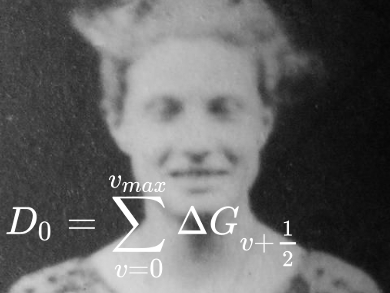Hertha Sponer was born on September 1, 1895, in Neisse, Silesia (in today’s Poland). She first became a teacher, which was an accepted way for women to be admitted to university at the time. She then studied physics in Tübingen and Göttingen, both Germany. In Tübingen, she worked as an assistant to James Franck, who later received the Nobel Prize in Physics. Sponer received her Ph.D. from the University of Göttingen in 1920 under the supervision of Peter Debye. In 1925, she won a fellowship from the Rockefeller Foundation that allowed her to work at the University of Califonia, Berkeley, USA, for one year.
During her time in Berkeley, Sponer worked on molecular spectra with Raymond Thayer Birge. Together, they developed the Birge–Sponer method or Birge–Sponer plot, which provides a way to calculate the dissociation energy of a molecule from its vibrational spectrum (equation pictured above, D0 = dissociation energy, ΔGv+1/2 = difference between energy levels). Sponer returned to Göttingen, completed her habilitation, and was one of the first women to teach physics at a German university. During her time in Göttingen, she worked with Edward Teller, known to chemists for the Jahn–Teller effect.
In 1934, Sponer lost her position due to the Nazi party’s prejudices against female scientists. She emigrated to Norway and became Visiting Professor at the University of Oslo. She then moved to the United States and in 1936, she was appointed Professor at Duke University, Durham, North Carolina. In 1946, Sponer married James Franck. She remained at Duke until her retirement in 1966, when she returned to Germany.
Sponer made important contributions to the application of quantum mechanics, to molecular physics, and molecular spectroscopy. She authored the first monograph on molecular spectroscopy [1], published in 1935, and confirmed many predictions of quantum mechanics using spectroscopy. She was Associate Editor of the Journal of Chemical Physics in 1940–1943 and 1947–1950.
Sponer died in Ilten, Germany, on February 27, 1968. The Hertha Sponer Prize of the German Physical Society, honoring outstanding young female physicists, is named in her honor.
Hertha Sponer is the answer to Guess the Chemist (74).
Reference
- [1] Molekülspektren und ihre Anwendung auf Chemische Probleme (in German),
H. Sponer,
Springer-Verlag Berlin Heidelberg, 1935.
ISBN: 978-3-642-99013-7
Sources
- Historical Faculty: Hertha Sponer,
Duke Department of Physics,
phy.duke.edu. - Sponer, Hertha Dorothea Elisabeth (in German),
Neue Deutsche Biographie (NDB),
Duncker & Humblot, Berlin, 2010.
ISBN: 978-3-428-11205-0 - Hertha Sponer: 1895–1968,
U. Anders,
quantum-chemistry-history.com.
Selected Publications
- Über die Häufigkeit unelastischer Zusammenstöße von Elektronen mit Quecksilberatomen (in German),
Hertha Sponer,
Z. Phys. 1921, 7, 185–200.
https://doi.org/10.1007/BF01332788 - The Energy Levels of the Nitric Oxide Molecule,
H. Sponer,
Nature 1926, 117, 81–81.
https://doi.org/10.1038/117081b0 - Optische Bestimmung der Dissoziationswärme von Gasen (in German),
H. Sponer,
Ergebnisse der Exakten Naturwissenschaften, Springer-Verlag GmbH Berlin Heidelberg, 1927.
https://doi.org/10.1007/978-3-642-94257-0_4 - Analysis of the Near Ultraviolet Electronic Transition of Benzene,
H. Sponer, G. Nordheim, A. L. Sklar, E. Teller,
J. Chem. Phys. 1939, 7, 207–220.
https://doi.org/10.1063/1.1750419 - Electronic Spectra of Polyatomic Molecules,
H. Sponer, E. Teller,
Rev. Mod. Phys. 1941, 13, 75–170.
https://doi.org/10.1103/RevModPhys.13.75 - Electronic Spectroscopy,
H. Sponer,
Annu. Rev. Phys. Chem. 1955, 6, 193–216.
https://doi.org/10.1146/annurev.pc.06.100155.001205




